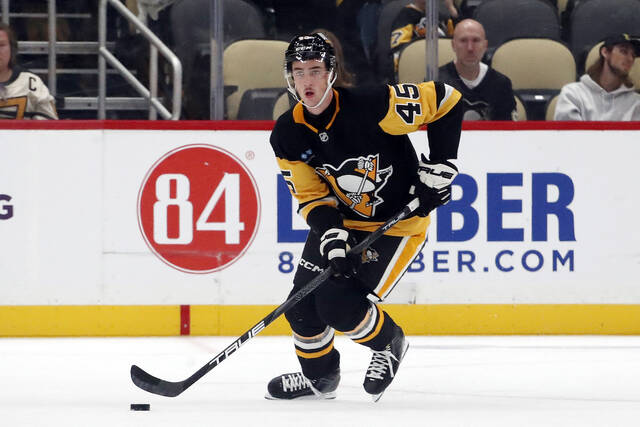It appears that Harrison Brunicke will start the season with the Pittsburgh Penguins.
He should.
Brunicke is just 19, but he’s been the Penguins’ best defenseman in the preseason and scored a nifty goal in their final exhibition game, a 5-4 overtime win over the Buffalo Sabres on Friday at PPG Paints Arena.
But if Brunicke plays more than nine games with the Penguins, he must spend the entire season in the NHL. If the Penguins decide against that, he has to be returned to Kamloops, his Major Junior team in Canada. He can’t be sent to the Penguins’ American Hockey League affiliate in Wilkes-Barre/Scranton.
That’s because of an agreement between the NHL and the Canadian Hockey League that mandates 18- and 19-year-olds be put back in Major Junior if they don’t play in the NHL.
That rule will be changed next year to allow each NHL team to send one 19-year-old to the AHL instead of back to Major Junior.
The Penguins and Brunicke could use that exemption now.
Brunicke looks good to go at the NHL level. But if he turns out to be unready during the nine games prescribed, he’s obliged to return to Major Junior, a level he’s very likely outgrown. His progress could halt or go backward. He’d be better served playing against older, better players in the AHL.
It’s a stupid and archaic rule as constructed now, and even with the one exception planned for next season.
Brunicke is under contract to the Penguins. His development is their only worry, and shouldn’t be subject to concern for the welfare of Major Junior hockey in Canada.
Major Junior hockey will survive without Brunicke, or without any drafted played who would benefit more by competing against men in the AHL than against boys in Major Junior.
Major Junior hockey is surviving without Gavin McKenna, the presumptive first pick overall in next year’s NHL Draft.
McKenna, 17, ditched Major Junior to play Division I college hockey at Penn State, matriculating via introduction of a new NCAA rule than allows players to move from Major Junior to college hockey.
McKenna had primary assists on the game’s first two goals in his debut for Penn State on Friday night.
The NCAA previously considered Major Junior players to be pros because they receive a monthly stipend (up to $600) for living expenses. But the introduction and expansion of NIL money in the college ranks made that directive superfluous and hypocritical.
McKenna is reportedly getting $700,000 in NIL money at Penn State. Slightly more than $600 per month.
McKenna outgrew Junior A. His development will be helped by playing against older, better players at the NCAA level.
He will also physically benefit from a Penn State schedule that plays 34 games plus playoffs and has greater emphasis on practice and conditioning. Major Junior teams play 70-plus games (including the postseason) and ride the bus a lot.
It’s a shame Brunicke can’t play NCAA hockey. Being under contract to the Penguins makes him ineligible to play in college.
Forward Ben Kindel, 18, is in the same spot as Brunicke.
The 11th overall selection in this year’s NHL Draft, Kindel had a scintillating preseason and remains with the Penguins. His Major Junior team is Calgary.
Kindel’s situation could change when injuries to Bryan Rust and Rutger McGroarty heal.
Brunicke’s situation could change because he’s a right-handed defenseman and the Penguins have lots of those, including veterans Kris Letang, Erik Karlsson and Matt Dumba.
But Brunicke is young, he’s better and the Penguins are rebuilding. He’s earned a spot. If he plays well, he should keep it.
The NHL needs to soften its allegiance to Major Junior hockey.
Once a player is drafted, he should play wherever his NHL team dictates.
Most players would still go back to Major Junior at 18 or 19.
But talent and development should dictate.
P.S. — Sergei Murashov, 21, was obviously the Penguins’ best goaltender in the preseason, and by a wide margin. But he got sent to Wilkes-Barre/Scranton, and logically so: A young goalie can get scarred playing behind a bad defense like the Penguins have.
But Murashov’s time isn’t far off. He’s a superstar talent.

